Wales Book of the Year Shortlist Announced
Now, I can finally talk about a few of the marvelous books I've been reading.
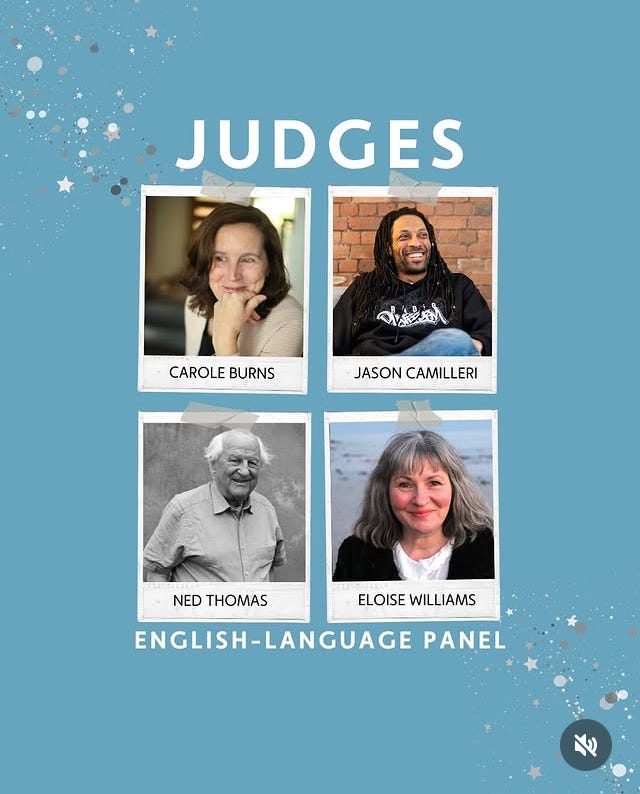
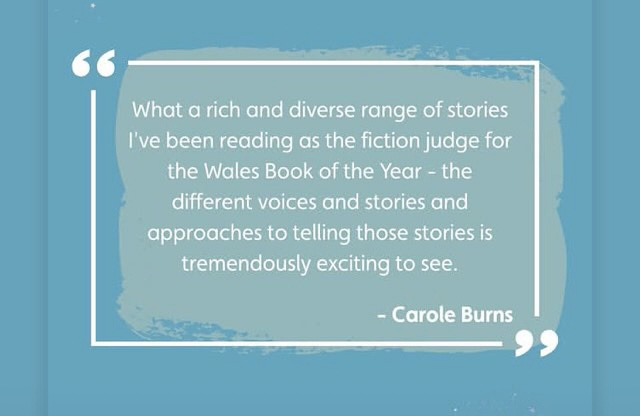
Since November, I’ve been secretly reading dozens of stories and poetry collections as lead fiction judge for the 2025 Wales Book of the Year Award. So it’s exciting that I am now able to share some of my reading with you. Finally!
Yesterday, Literature Wales executive director Claire Furlong and I announced the English language shortlist for the 2025 Wales Book of the Year Award on Lynn Bowles’s BBC Radio Wales programme — twelve books which, we now hope, begin receiving a bit more well-deserved attention.
Before I read out the titles, Lynn asked me what I had been looking for in these books as a judge - a great question, one I have been thinking about a lot, not only as a judge, but as an author too (because surely I want my own books to have these qualities, too).
And so I told her: Whether into a new or familiar world; whether into the heads of vividly alive characters; whether entranced by the story or the language itself, I want to be transported.
(Our segment starts at about ten minutes into Lynn’s show.)
So now, drumroll please (for those of you who weren’t perched beside your radio or phone on Sunday).
The Shortlist for Fiction
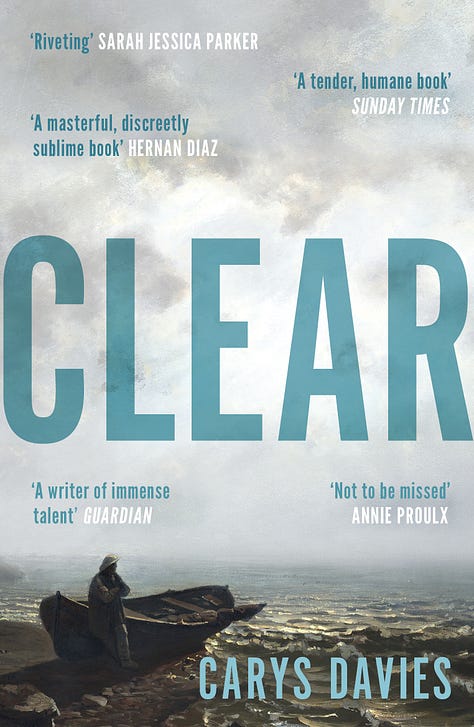
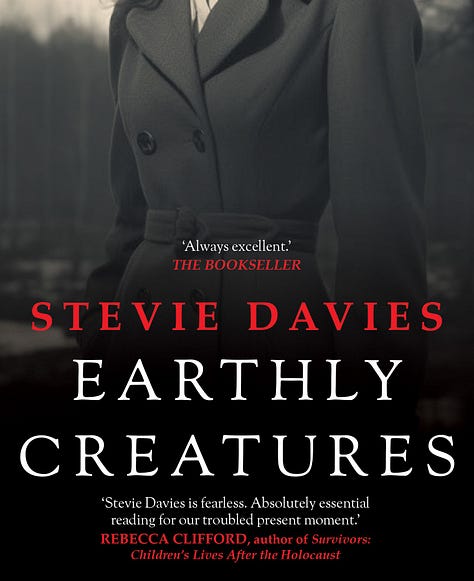
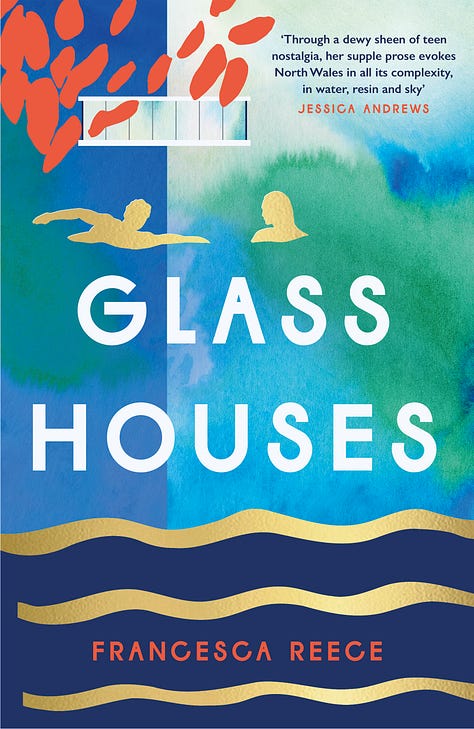
These three novels shone out to me as soon as I read them: for their gripping stories, vivid characters, evocative settings, and their often gorgeous sentences. Word by word, they drew me in.
Each of them, also, has something to say about our world – these are novels about inequity, injustice, the haves and the have-nots. At this moment in time, that feels especially important.
Glass Houses by Francesca Reece (Tinder Press) revolves around Gethin, a 30-something, mostly employed forester in North Wales who rekindles a romance with his teen-age love, now a filmmaker in London. Against the backdrop of the vacant architect-designed house of the title, made of wood and glass and air and which Geth looks after like an adopted child, this post-Brexit novel examines the deep connections between these two beautifully drawn characters, the economic realities that separate them, and the political climate that may or may not deepen their divide.
Clear by Carys Davies (Granta) is an intricately woven novel set in the midst of the Scottish clearances in 1840s, on a remote island where one stubborn man, Ivar, lives in rugged isolation – until the man sent to evict him falls off a cliff. Not knowing his purpose on the island, Ivar nurses him back to life, and despite not sharing a language, Ivar and his enigmatic guest, an unemployed preacher, forge a precarious friendship. But what will happen when the preacher is well enough to perform the task he was sent to do? Davies won the fiction category in 2019 with her book, West.
Earthly Creatures (Honno) by another previous fiction winner, Stevie Davies, is a frighteningly timely novel which opens in 1941 in Nazi Germany as its strong-willed protagonist, 19-year-old Magdalena Arber, is sent to work as a teacher in East Prussia. At first thrilled to serve her country, Magda quickly begins to understand the realities of the Nazi regime, prompting the question all of us must consider: She is just one person. What can one person do? It’s a question for all of us right now.
The Shortlist for Creative Non-Fiction



In Nightshade Mother: A Disentangling (Calon Books), Gwyneth Lewis, who was the first National Poet of Wales, writes a revealing, painful account of her difficult relationship with her mother – revered in her community as a teacher. Beautifully written and intelligently analytical, this memoir’s subtitle is apt; as Lewis explores this seemingly psychologically abusive relationship, she also is working to disentangle it from her own roots as a poet and a person.
The next two books explore and explain humans’ relationship to nature and the landscape, both authors looking at our misconceptions about the history of the landscape; some of the mistakes governments have made; and also positive ways forward - while using very different narrative approaches.
TIR: The Story of the Welsh Landscape (Calon Books) by Carwyn Graves has a unique structure: it is organized around seven Welsh words for parts of our landscape such as cae or rhos, and how their layers of meaning in Welsh, somewhat lost in their English translation, helps us understand that land and how human beings have interacted with that land.
Nature’s Ghosts: the world we lost and how to bring it back by Sophie Yeo (HarperNorth) works as a dazzling, informed guide that takes us through human time and geological time and to sites in Britain (including Wales), Transylvania and Finland in search of the knowledge and experience that might help humans as well as the animals we share this earth with. Can humans move over just a little bit to save other species from extinction?
The Shortlist for Poetry

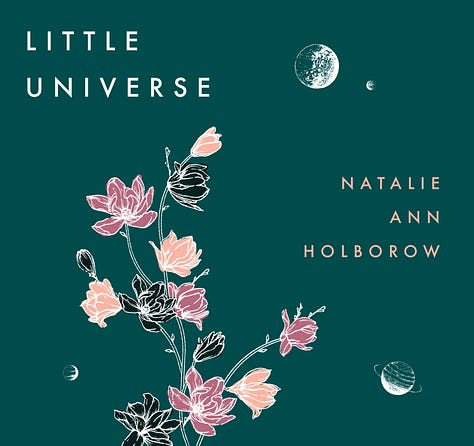
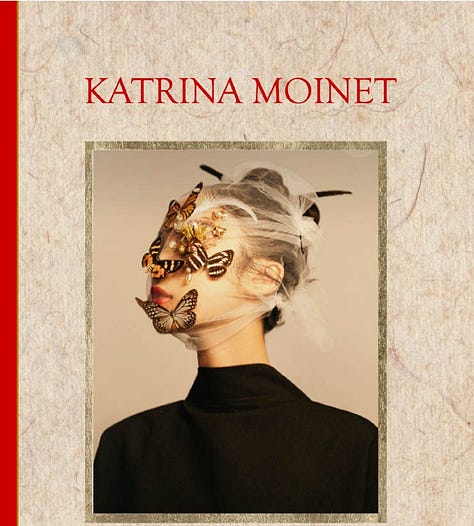
Three books of poems, three entirely different voices – which is something I love about this poetry short list.
Rhian Elizabeth is plain-speaking and direct in the poems in girls etc (Broken Sleep), in which she explores her own history, such as her experiences as a teen-age mother, and her grief and guilt about being an imperfect mother. Be sure to read “if we could just go back I’d push you higher” with its killer last line.
Katrina Moinet in Portrait of a Young Girl Falling (Hedgehog Poetry Press) has an entirely different voice – thorny, if you will (that is not a criticism!) There’s more internal rhymes, more playing with form and repetitions, such as in the poem, “Submission,” which in pale type simply repeats the phrase “I have a voice, I have a voice, I have a voice…” Yes, she does.
And then Natalie Ann Holborow in Little Universe (Parthian) has yet another approach to poetry – more lyrical, I would say, using imagery and evoking place, such as the Gower, or a hospital, as she explores themes such as illness and grief.
The Shortlist for Children’s Literature

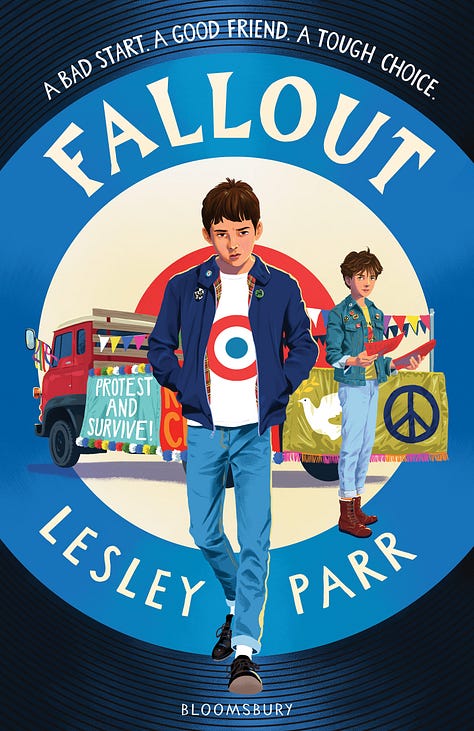
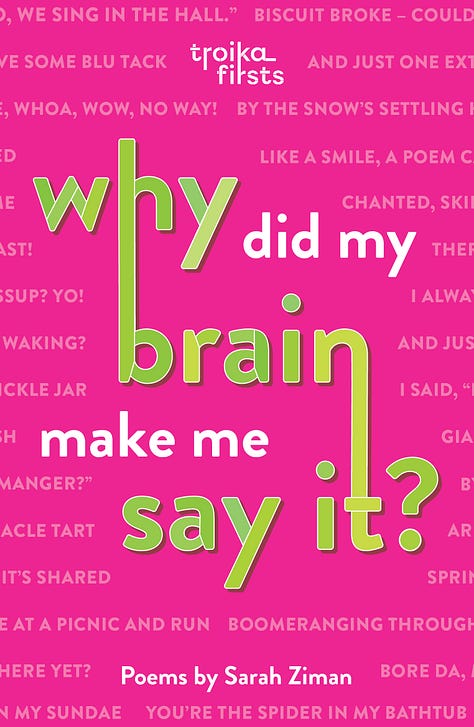
First, two wonderful novels with charismatic young characters who are funny and snarky and so sympathetic as they deal with the world that adults have messed up.
A History of my Weird by Chloe Heuch (Firefly Press) is an insightful and fascinating read with a neurodivergent narrator who needs to find new friends when an injury means her gymnastic friends turn against her. I was rooting for her through the entire book.
Fallout by Lesley Parr (Bloomsbury) is a wonderful, moving story set in Wales in 1980 about a boy growing up in an unsavory, criminal family who is therefore typecast into that mold – though a friendship with an older man and a girl from a more wealthy background that may help him through.
Then there is Why Did My Brain Make Me Say It? (Troika) by Sarah Ziman, a delightfully inventive, playful collection of poems. The children’s category judge Eloise Williams, when we were discussing the short list choices the other day, said she felt this book would make kids love poetry. I think she’s right.
On July 17, we announce the winners in each category and an overall winner - and remember you can have your say, too, in the People’s Choice Award, where you get to choose your favorite book. Read the books and then vote!
Stay tuned for the winners announced on July 17 at a ceremony in Cardiff - tickets available via Literature Wales.
And thanks for reading On and Off the Page! Subscribe for free to receive new posts and support my work.




I highly recommend the two I have read: Nightshade Mother, girls etc. Now to get reading at least some of the others expecting them to be of the same brilliant quality ...